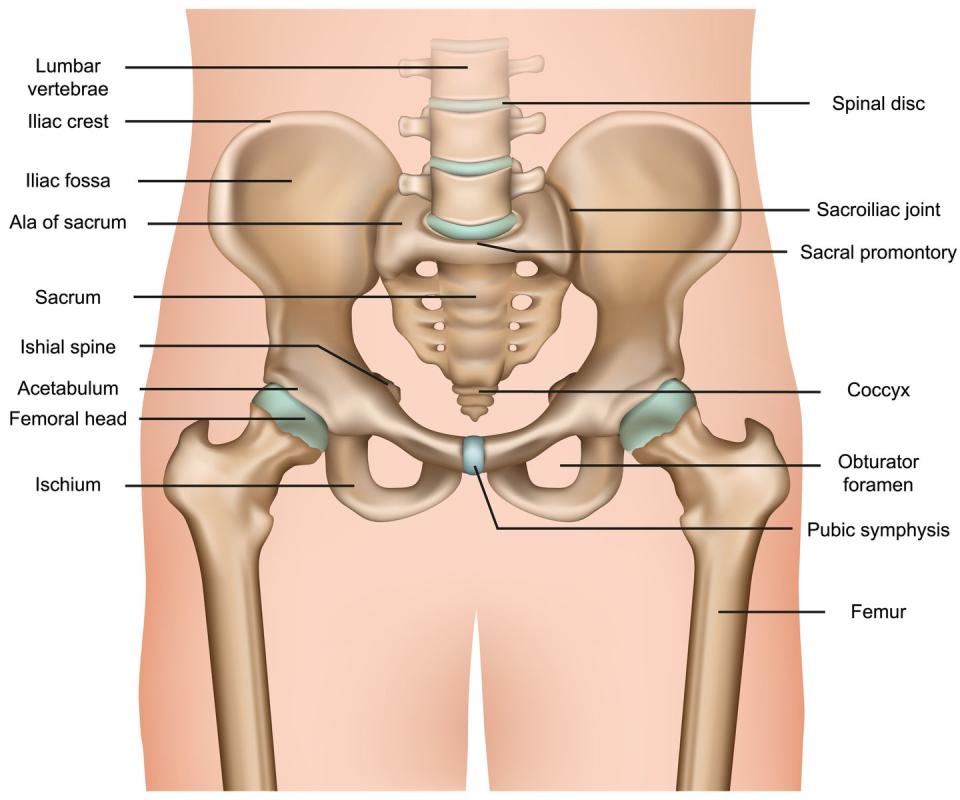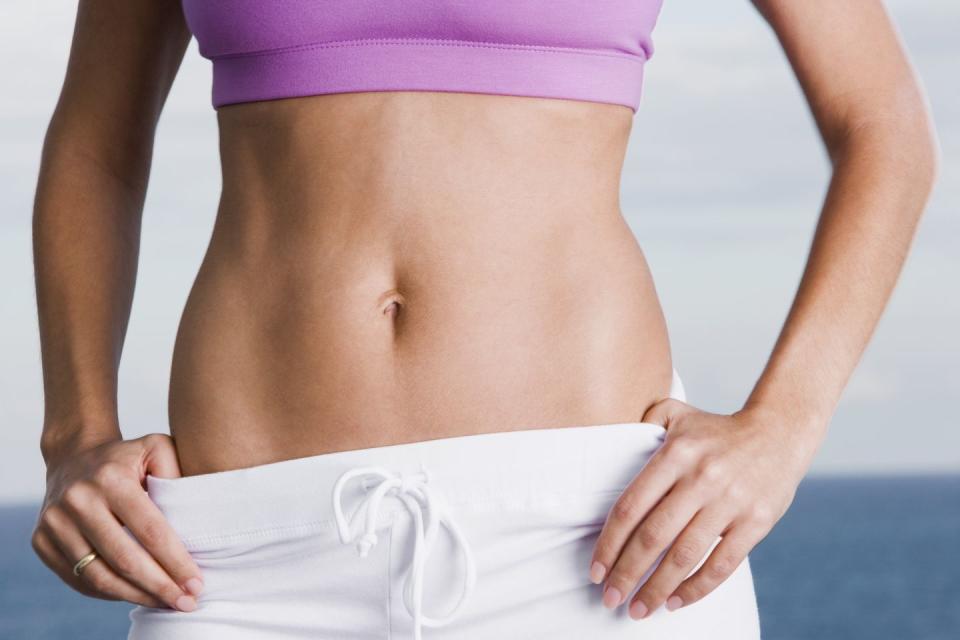What are hip dips and why do you get them?
Hip dips (the BS buzz-term for gentle, small indentations found below your hips and above your thighs, sometimes also called 'violin hips') used to be just another body part the media seem to want to make people feel bad about.
It's one of many totally normal and non-problematic parts of a healthy body, like not having a thigh gap, a thigh brow, or lower-back dimples (... we know, the list is endless), that are highlighted and shamed within the toxic diet and body-shaming culture.
Thankfully, now, we're starting to change the trajectory of this conversation and reject harmful and reductive internet moulds, with many proudly celebrating their hip dips on social.
Hip dips are related to the shape of your hip bone (the pelvis), and are also determined by the shape of your glutes and fat distribution - so they're largely controlled by genetics, and explains why some people have them and some don't.
Nevertheless, an average of 18.1k search for the term every month, so if you’ve found yourself Googling 'what are hip dips', 'how to get rid of hip dips' or 'hip dip workout', you're not alone. But, fortunately, you're in the right place now to get some accurate expert advice.
So, before you go trying to overhaul your fitness routine or look for the best exercises for a bigger butt, we're going to walk you through everything you need to know, with the help of David Wiener, training specialist for the Freeletics fitness app.
What are hip dips?
‘Hip dips are naturally occurring, inward curves,’ says Wiener. Naturally occurring.
‘They are caused by the shape of your pelvis. Although not everyone will have noticeable hip dips, if reduced to a skeleton, all of us would have an indentation where the hip bone meets the top of the thigh [the femur]. Hip dips are a normal part of your body’s structure,' he explains.
What causes hip dips?

The ilium is the top and biggest part of the hip bone and forms the widest part of the pelvis. When it's very large, it can protrude further, making it more likely for an indentation to be present as the bone curves back inwards.
Moreover, the greater the distance between the ilium and the top of the femur (the greater trochanter - the bony protrusion right at the top of the thigh bone), the greater the inward indentation.
Muscle, tendon and fat distribution can also contribute to the appearance of hip dips.
Are hip dips normal?
‘Hip dips are not a sign of being healthy, unhealthy, overweight or underweight,’ says Wiener. ‘Although the amount of body fat you have can make hip dips more noticeable and can be the result of having a higher level of muscle mass, it’s important to remember that hip dips are a part of your bone structure and to do with the shape of your bones. While you can enhance your body shape through exercise and diet, you cannot change your bone structure.’
Because of the variation in pelvis shapes, your hips may look different from someone else's — and that includes your hip dips, too.
So, tempted by any of those, 'How to lose hip dips in a week'-type videos? Scroll on by, they're simply clickbait.
If you are worried about carrying a harmful level of body fat, there are safe ways to lose weight well, bringing your fat-to-muscle ratio into healthier balance. Check out our expert-led, safe, sustainable advice on how to lose body fat, how many calories to eat to maintain safe fat loss or how to calculate the best macros for fat loss, for you.
Hip dips vs. love handles
Much higher than hip dips, 'love handles' (see also: muffin top... WHO comes up with these names?!), as they're so fondly known, is a term referring to fat located on the sides of the abdomen and are not related to your bone structure. They can be linked to genetics, which dictates where we store fat it in the body.

How to get rid of hip dips
Before we go any further, we'd like to repeat again: there is absolutely nothing wrong with hip dips, and while exercising to build muscle mass and lose body fat can help minimise their appearance, it won’t make them completely go away. That's something to make peace with.
What you can do is focus on exercises that work multiple lower body muscle groups (like compound exercises including squats and lunges) and sub in isometric exercises (e.g. fire hydrants and clams) where necessary.
Top tip: Pilates and reformer Pilates workouts and classes incorporate various isometric exercises, if you need inspiration or could do with some guidance on the best to try.
However, make sure you focus on strengthening your entire lower body and incorporating progressive overload (not necessarily by lifting heavier, but perhaps with different techniques like drop sets) – not just zeroing in on your glutes. There's more to life than hip dips and that's true for your fitness, as well. Your workouts should be fun.
Bottom line: don't worry about your hip dips.
‘Obsessing over any part of your body, especially those which cannot be changed, is potentially very damaging to your health,’ says Wiener. ‘It’s important for women to try to love their bodies, rather than being continually determined to change them.’
Hip dip 'exercises': 9 exercises for lower-body strength
Though it's not recommended to target just one body part (full-body strength and fitness is what you should be gunning for), strengthening your lower body can have an impact on the appearance of hip dips. If you have checked in with your overall body fat levels and want to decrease your body fat percentage, then exercise can help.
For a great lower-body focused session to tone your hips, thighs, abdominals and glutes, add the following exercises into your home workout routine:
1. Squats
a) Standing with feet hip-width apart hinge at the knees to come into a squat position – making sure your knees track over your toes and don't extend past.
b) With the weight in your heels push back up to standing, squeezing your glutes at the top.
2. Hip abduction
a) Lying on your side, use your top arm to support your upper body by placing it in front of your chest.
b) Keep your upper body and core as still and engaged as possible and raise your top leg towards the ceiling.
c) Lower back down – with control – and repeat.
3. Glute bridges
a) Laying on your back, bring your heels up the mat so they are a few inches away from your bum, knees pointing upwards.
b) Take your feet slightly wider than shoulder-width apart with toes pointing outwards and make sure your knees are pushing outwards to engage your abductors (side glutes).
c) Thrust your pelvis up towards the ceiling, making sure your upper back stays on the floor, and the driving force of the movement is only from the waist down.
d) Once you reach the top, squeeze your glutes. Try and keep them engaged throughout the whole movement. Lower and repeat.
4. Clams
a) Start by laying down on the ground on your side. Pop your head onto the arm that's on the ground. Start by moving your hips up to a 45-degree angle and your knees to a 90-degree angle.
b) Push your knee away from your core, but keep your feet pressed together.
c) Pause when you get to the top of the move, clenching your glutes and ab muscles, and return to the ground. Repeat.
5. Fire hydrants
a) Start on all-fours in a tabletop position, ensure your core is engaged and your back stays straight.
b) Keeping your legs at a 90-degree angle, raise one leg until it is in line with your hip. Drive the leg up with the knee, and ensure the foot and the knee are in-line throughout the whole movement.
c) Engage both glutes to ensure the hips stay square and centred.
d) If you feel too much movement through your upper body, bring your hands slightly to one side (the side of the planted leg) for more stability. Repeat.
6. Glute rainbows
a) Come onto all fours on your mat. Raise your left leg and extend it straight behind you.
b) Moving in an arc-motion and keeping your leg level with your body sweep it behind and across your right leg. Then, sweep it back past your starting position to a lateral position with your left hip. Return to centre and repeat on the other leg.
7. Side lunge
a) Standing at the top of your mat with your feet together, engage your core and lunge laterally, pushing your bum out behind you and keeping your upper back flat.
b) Push through the heel of your lunging foot and repeat.
8. Curtsy lunge
a) Standing with your feet hip-width apart lunge backwards, crossing your lunging leg over to the opposite side. You'll arrive in a deep curtsy position.
b) Drive through the heel of your front foot to return to your starting position. Repeat.
Make sure you keep your workouts well-rounded as not only can too much repetition lead to overuse injury, but overtraining your hip area can actually build muscles that make them look bigger. An hourglass booty sounds like no bad thing to us, but it may not be what you want to emphasise with your exercises.
9. Forward lunge
a) Keeping your back straight, engage your core muscles and place your hands on your hips to stay balanced.
b) Take a big step forward with your right foot and bend your knee until your right thigh is parallel to the floor. Allow your back heel to lift, but don’t let the knee touch the floor.
c) Step back to the starting position, then repeat on the opposite leg.
3 lower-body workouts to sculpt leg, glute and hip muscle
For those of you who prefer to have your workouts sorted for you, we've asked three superstar PTs to share their best lower-body workouts below.
1. Beginner lower-body workout
Expert Alice Liveing created an exclusive 28-day fitness challenge just for you. Each week, you do three workouts to work your full body. The beginner lower-body and core sessions will coach you through three supersets (two exercises repeated back to back with a 60-second rest in between). You repeat each superset three times to build confidence and strength.
2. 10-minute lower-body workout
Short on time? Try this side butt routine to build muscle for round, curvy hips from 'fun workout girl' Lilly Sabri. No weights required and it's only 10 minutes, but boy does it burn.
3. Kayla Itsines' 14-minute lower-body workout
She's the Australian queen of Sweat and an amazing trainer to boot. This speedy workout – part of the 28-day workout challenge she designed exclusively for WH (lucky us) – targets your lower body with lunges, squats and glute bridges. Basically, everything to build strong, lean lower-body muscle.
Related stories:
Become a member of the Women's Health Collective and get full access to the Women's Health app, available to download on Google Play and the App Store, to get the latest celebrity-inspired workouts and fitness content.
You Might Also Like

 Yahoo Movies
Yahoo Movies 
